Ivo Dominguez Jr. and James C. Welch
Queer activists and founders of the Gay and Lesbian Alliance of Delaware and the Delaware Lesbian and Gay Health Advocates.
Dominguez born in 1958 Welch born in 1951,
Wilmington, DE
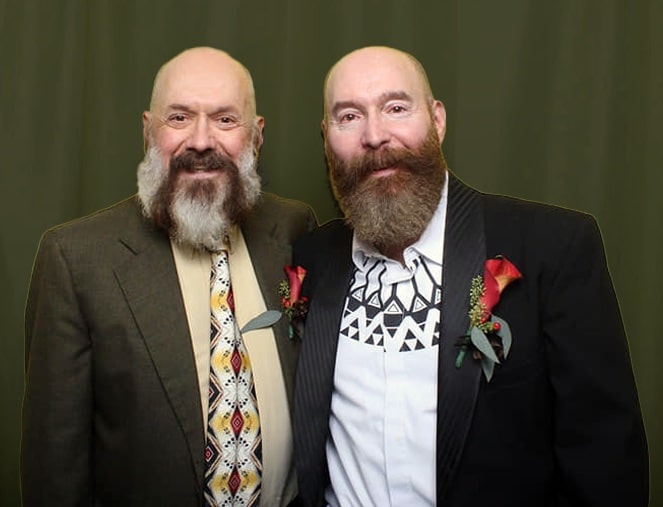
Long-time partners Ivo (pronounced EE-vo) Dominguez, Jr. and James C. Welch began their queer activism in the late 1970s and throughout their decades of activism have organized countless HIV/AIDS education and fundraising events. They also founded Delaware’s first statewide gay rights organization, the Gay and Lesbian Alliance of Delaware (GLAD); opened the state’s first alternative/queer bookstore, Hen’s Teeth, in Wilmington; founded the Delaware Lesbian and Gay Health Advocates (DLGHA), which was Delaware’s first HIV/AIDS service agency, now known as AIDS Delaware; and opened Delaware’s first LGBTQ+ community center, the Griffin Community Center. Today, they live in southern Delaware and have continued their activism on a national scale.
Despite the wildly different reactions Ivo Dominguez, Jr. and James C. Welch experienced when they came out to their families, the couple has had a lasting impact on Delaware’s queer community for decades.
Welch, a Delaware native born in 1951, recalled that his family was extremely supportive of him when he announced he was gay, sometime around 1976 or 1977 after he had attended college in Indiana and returned from Ethiopia after serving in the Peace Corps. His father’s response was, “the plans I had for you were my own. They weren’t yours. I love you.” and gave Welch a hug.
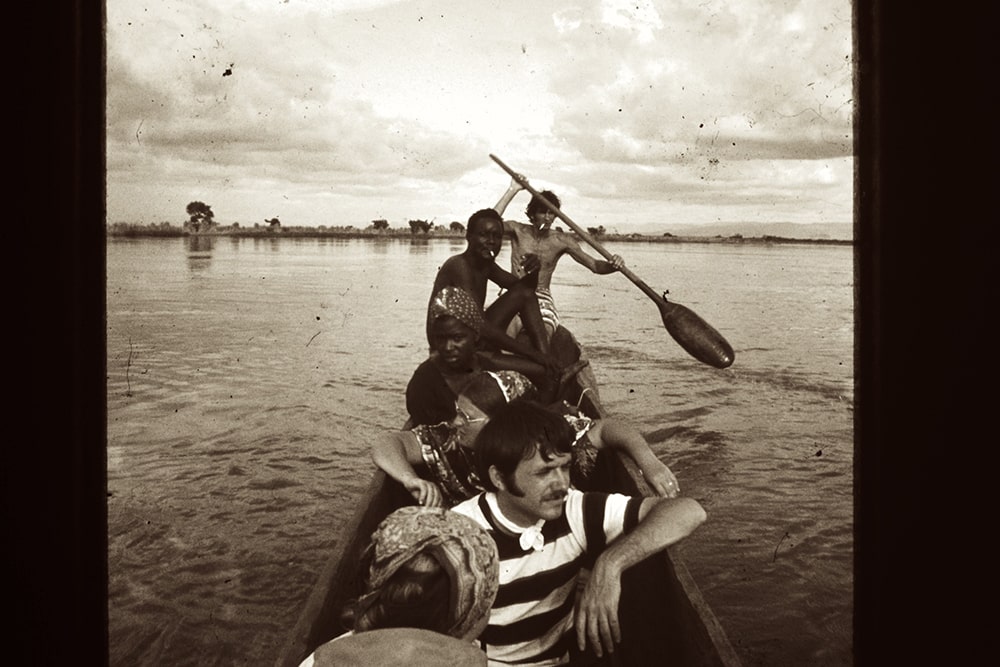
But his partner, Dominguez, whom he would meet later in Newark, Delaware, was disowned by his family when, in 1976, they opened a love letter from a man to Dominguez, discovering his queer identity. Born in Cuba in 1958, Dominguez became a naturalized citizen when he and his family moved to America in 1961. He found a new community as he began attending meetings of the University of Delaware’s Gay Community. Unfortunately, that was also around the same time as a discrimination lawsuit that the group’s advisor Richard Aumiller brought against the university president’s “pernicious insensitivity” and “wanton disregard” for Aumiller’s rights. Aumiller won that case, but the Gay Community collapsed after the discriminatory firing of Aumiller. Around 1978, Dominguez reorganized the Gay Community as the Gay Student Union (GSU), created its first budget, secured a student office space, and began arranging weekly coffeehouse events and public speakers.
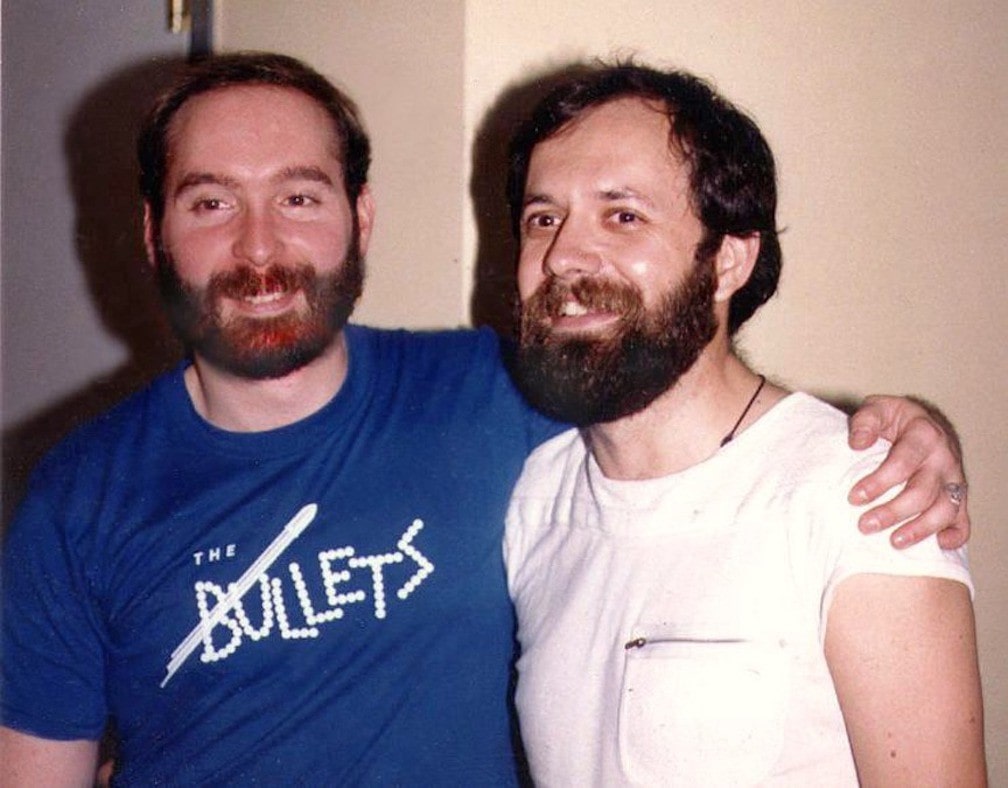
The following year, Dominguez and Welch met at the Lobby Bar, originally a disco for heterosexual people and located off one of the main thoroughfares in Newark. According to Dominguez, they would spend the next six months flirting before officially dating in February 1979. The place they met would establish a new queer connection when, after facing financial hardships, the bar’s owners proposed to Dominguez, who was manning the GSU office’s phone line at the time, to turn the establishment into a gay bar if the GSU could pay the back rent. The GSU provided three months of back rent and the Lobby Bar became the most diverse gay bars in the state. Dominguez recalled how he managed this in a 2023 oral history interview with the Delaware Division of Historical and Cultural Affairs:
I called every single person I knew. Everybody chipped in money. We paid their back rent. And then we picked a date where I, and a guy named Steven G. …He and I went onto the dance floor and started dancing together. And over the course of like about a week and a half, more and more of us were willing to go there and start dancing together. And eventually the straight people started to leave because they were feeling very uncomfortable about it. So, the Lobby became a gay bar because the student group came.
The same year, Domginuez and Welch organized a bus trip to the 1979 March on Washington for Gay and Lesbian Rights. It was the first time they both stood in a public place and self-declared as queer. In an era where lesbian and gay people were legally discriminated against and publicly misunderstood, it was a brave act for Dominguez and Welch to be so openly queer.
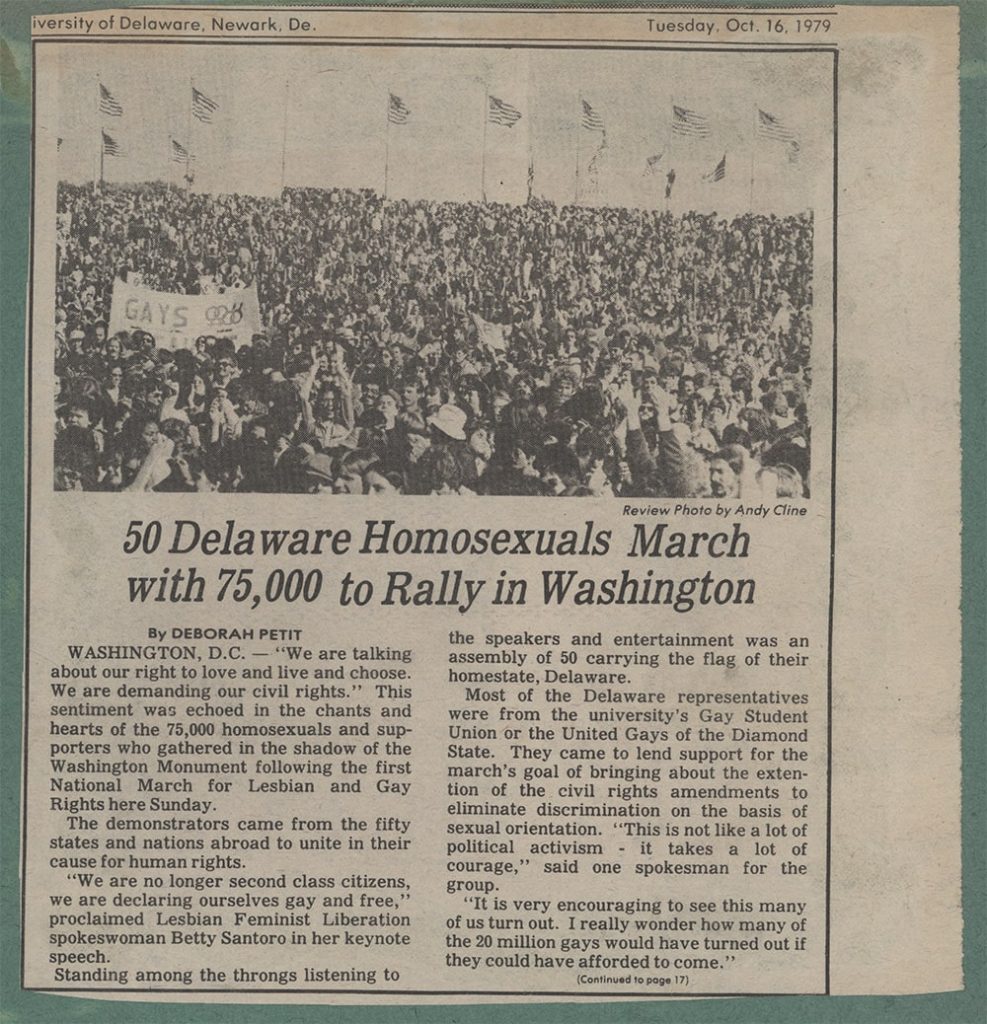
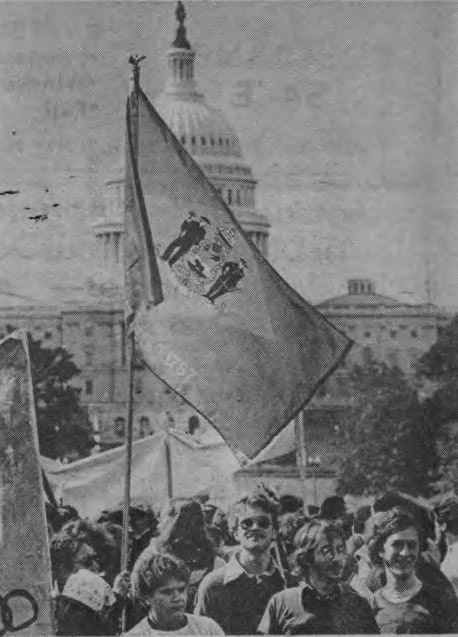
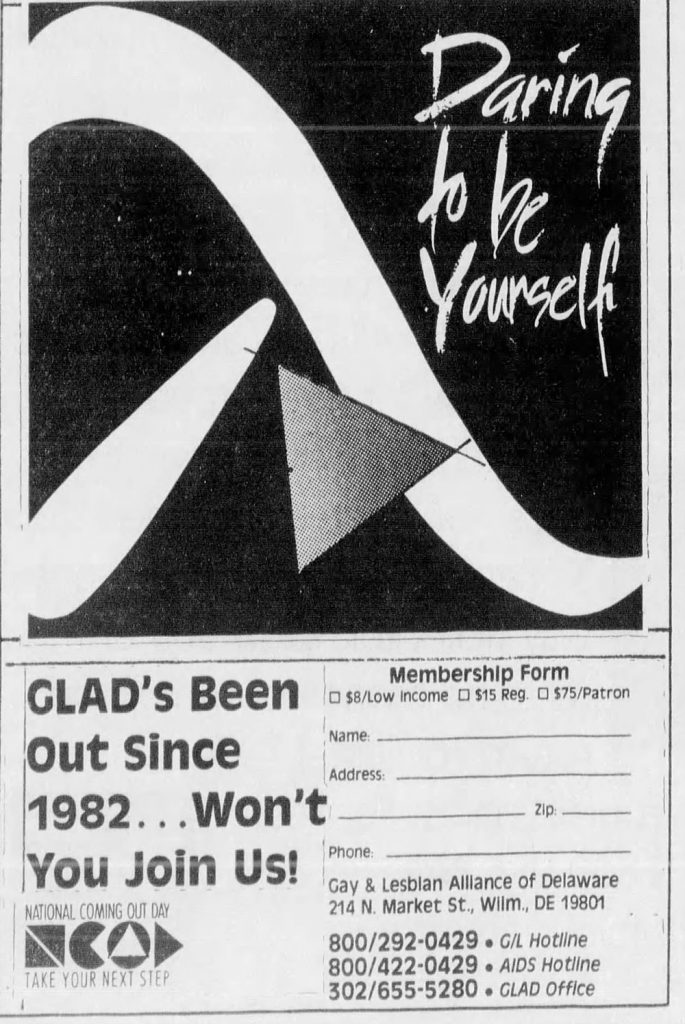
After serving in the Peace Corps, Welch returned to school, attending the former Nursing School of Wilmington, and received his nursing degree, giving him a helpful medical background as the early cases of HIV/AIDS swept the globe and began claiming thousands of lives. By 1982, Dominguez and Welch created Delaware’s first statewide gay rights organization, the Gay and Lesbian Alliance of Delaware (GLAD), along with its Health Issues Committee, as a way to disseminate information and help patients of HIV/AIDS in Delaware when legislators and health officials were slow to implement effective policies. From the basement of their home, they created a 24/7 hotline, run completely by volunteers, to answer any questions related to queerness, reproductive health, substance abuse, and HIV/AIDS.
By the time Delaware saw its first case of HIV/AIDS in 1983, GLAD had already partnered with the Delaware Nurses Association to deliver the first public HIV/AIDS educational forum in the state at the Christiana Mall in New Castle County. GLAD provided specific HIV/AIDS training to its hotline volunteers and initiated a meeting with the director of the Delaware Division of Public Health and the Blood Bank of Delaware to discuss definitions of risk behaviors and future HIV/AIDS testing options.
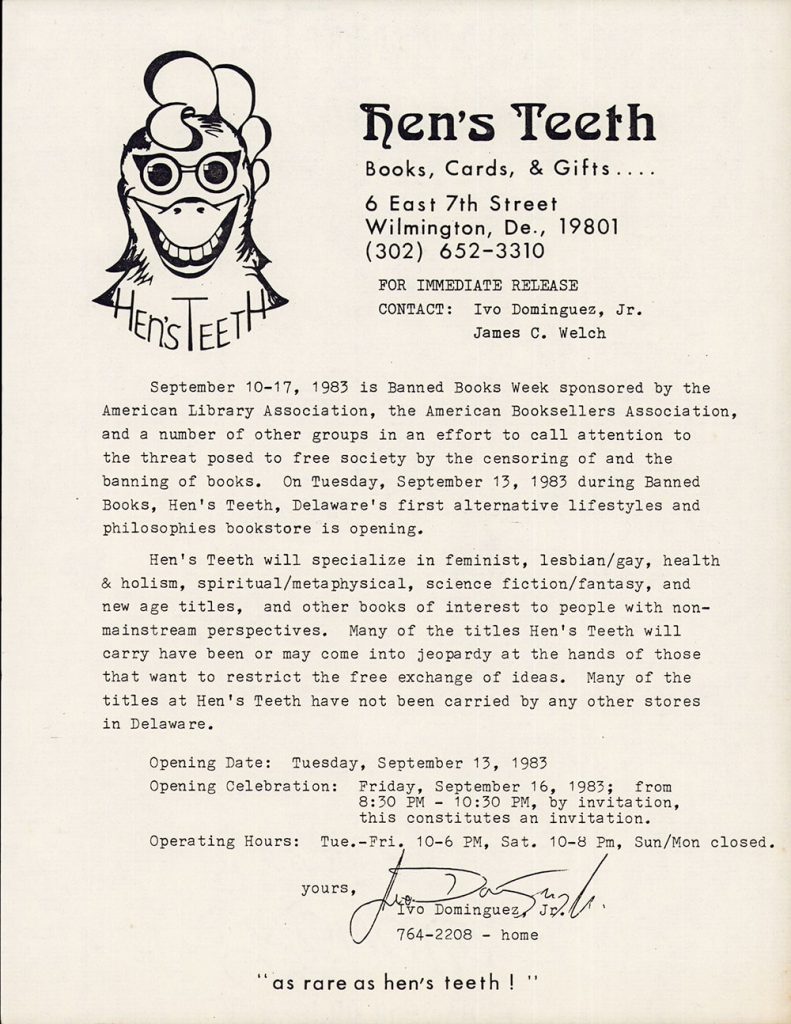
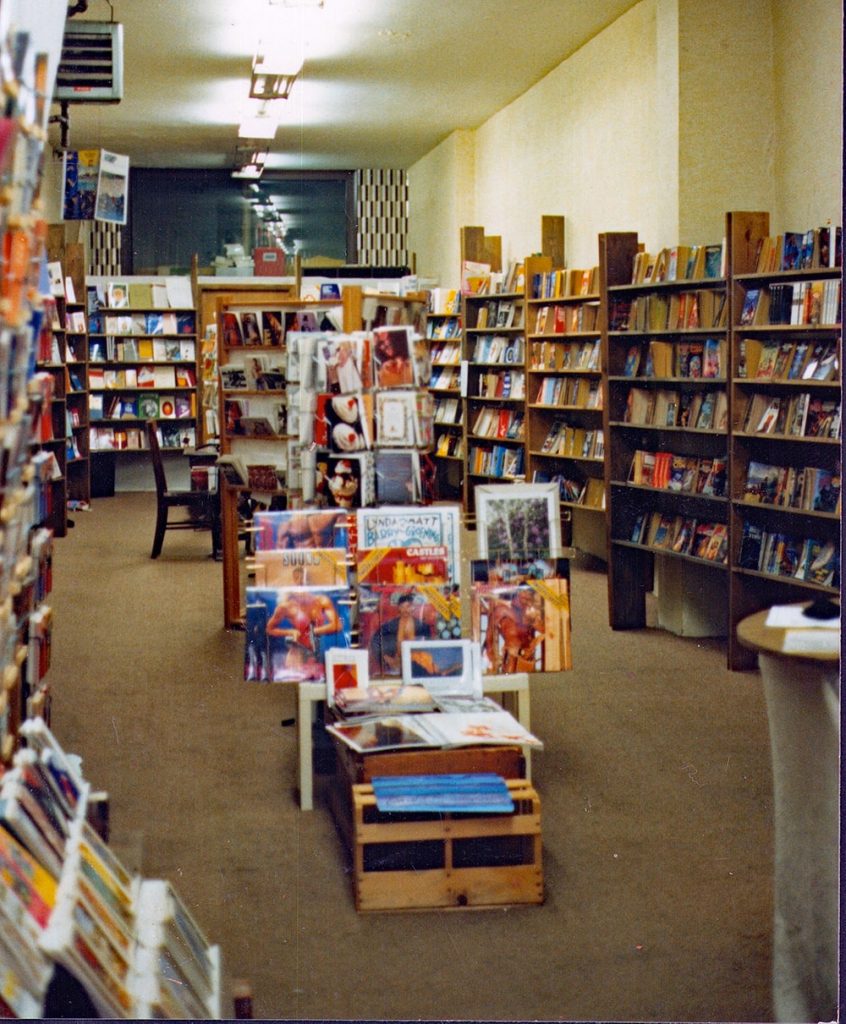
In 1983, Dominguez, now an author of metaphysical books, and Welch also opened Delaware’s first queer/alternative bookstore called Hen’s Teeth, located at 406 Market Street Mall in Wilmington, Delaware. Dominguez began researching metaphysical topics in high school, but was disappointed in the literature he was able to find at the time. Hen’s Teeth expanded on his interest in the metaphysical, and also sold queer, feminist, lesbian/gay, science fiction/fantasy, health and holism, and metaphysical books, as well as titles of interest “to people with non-mainstream ideas,” according to a books store flyer shared by Dominguez. They specifically did not sell pornographic materials, like most queer bookstores did at the time, for fear that Wilmington’s Licensing and Inspection office would shut them down. The store became a place for local pagans, progressive thinkers, and queer people to meet and share ideas. The name “Hen’s Teeth” is a reference to Delaware’s state bird and is an idiom referring to something extremely rare. Through the pagan community congregating at Hen’s Teeth, Dominguez and Welch formed a Wiccan study group that transformed into a formal assembly, the Assembly of the Sacred Wheel, a Wiccan religious organization. Today the assembly is a legally recognized nonprofit that has twelve covens.
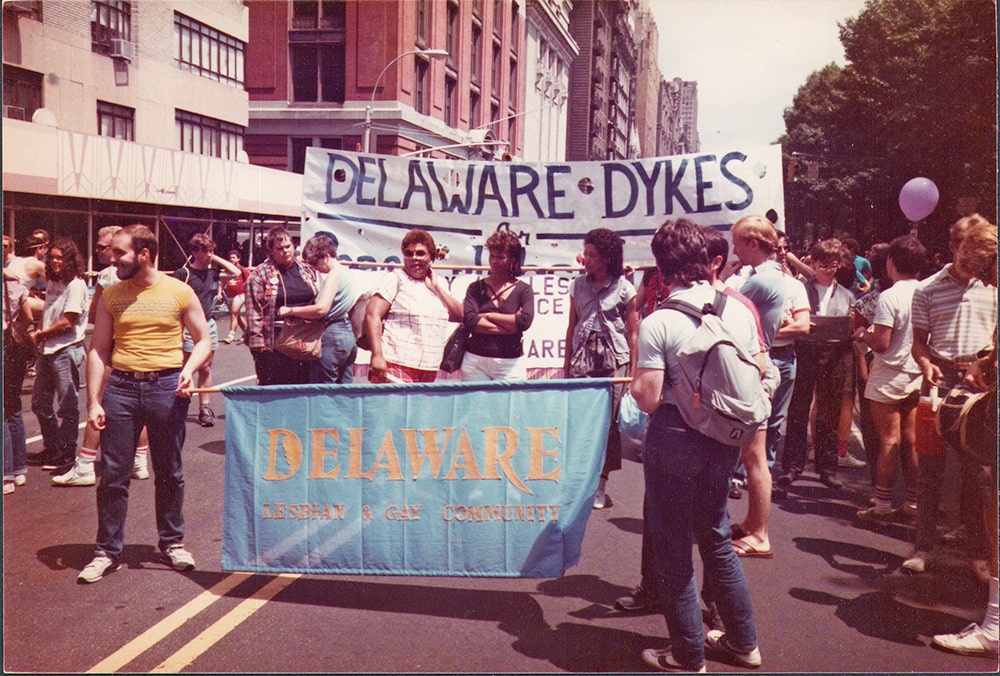
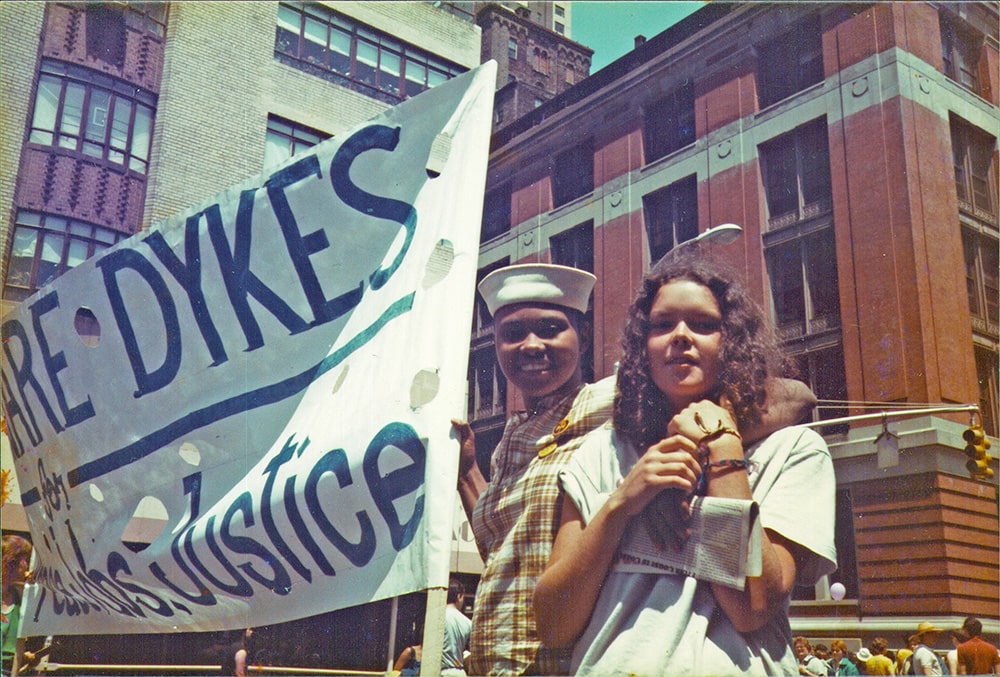
In 1984, GLAD’s Health Issues Committee spun off to form Delaware Lesbian and Gay Health Advocates (DLGHA), Delaware’s first statewide HIV/AIDS service organization. Dominguez would serve as its executive director. At a time when the Red Cross would not transport patients with HIV/AIDS for fear of being infected when it was erroneously believed to be an airborne disease, Welch and DLGHA volunteer Joan Schwartz as medical professionals knew this not to be true and created a system of volunteers to address this gap in care. Welch, Dominguez, and Schwartz founded the “buddy system” as a way to care for community members that went beyond just driving patients to appointments. Dominguez described what was required of a “buddy,” who was like a case manager, in the 2023 oral history interview:
This is the person that was going to help you find the right resources you needed, make sure that you were eating, that you were taking your meds. That if you needed to have physical stuff done, like your laundry or dishes. So it was almost halfway between being hospice and being a caseworker.
Many of the DLGHA volunteers working the hotline would shift into the in-person work required by the buddy system. These volunteers drove HIV/AIDS patients from as far as Sussex County to Christiana Hospital in Wilmington, the only hospital accepting HIV/AIDS patients at the time. This was also decades before Route 1 was completed to connect Delaware’s beach towns and the Wilmington area, making the trip even more time-consuming.
In 1985, Welch joined the Delaware Division of Public Health as a nurse consultant at the Alternate Test Site Program for HIV and antibody testing, the state’s first official HIV/AIDS effort. Through this position, Welch developed what became the AIDS Program Office from scratch. This included finding unused state-owned office space, as well as painting, furnishing, and maintaining the testing site, which was then located at the now-closed Emily P. Bissell Hospital in northern Delaware. He also helped the Delaware Department of Correction adopt an official HIV/AIDS policy in 1986. He worked for the division for two decades, focusing on HIV/AIDS prevention and treatment. At the request of former Governor Ruth Minner, in 2005 he served as Health Services Administrator for the Delaware Department of Correction and was the agency’s first full-time, medically trained employee. In 2009, he was appointed chief of the newly established Bureau of Correctional Health Services where he made substantial progress in increasing the medical and mental healthcare of inmates in Delaware’s prison system.
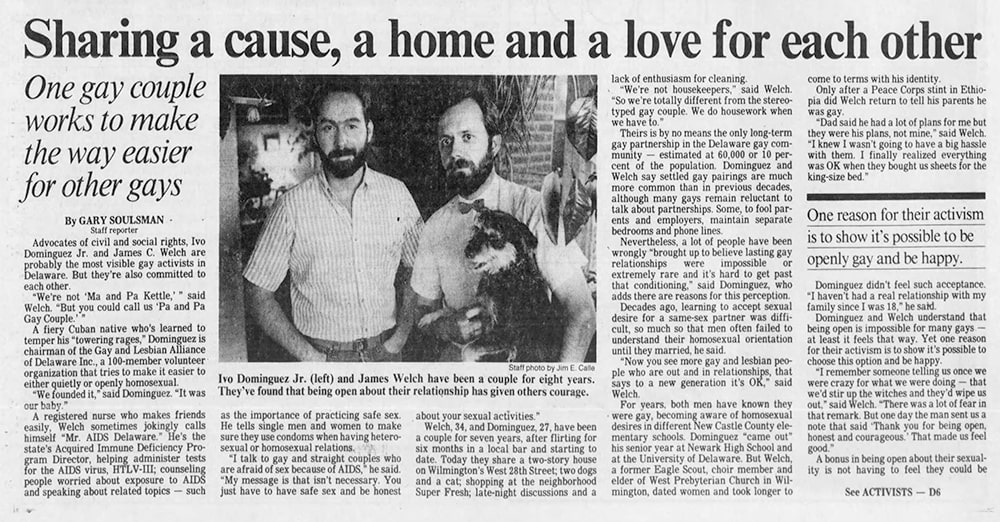
During that time, Dominguez and Welch were sometimes publicly at odds because of their different positions with state government and local advocacy. On that conflict, Welch said in a 2023 oral history interview with the Delaware Division of Historical and Cultural Affairs:
I was the state person and Ivo was the DLGHA person, and when we were at those commission meetings, I had to take the state’s perspective. …We had a rule at the house: We had fifteen minutes, each of us, to talk about our frustrations with HIV and AIDS and the organizations. And then we went on with our lives and the other organizations we were a part of.
After a thwarted attempt to purchase a property in Midtown Brandywine in 1983, Dominguez and Welch bought and renovated a building at 214 N. Market Street in Wilmington, Delaware, to create the Griffin Community Center. This was Delaware’s first LGBTQ+ community center and served as the home for GLAD, DLGHA, and the HIV/AIDS hotline, among other organizations. Dominguez and Welch lived out of the top floor of the building and were essentially immersed in daily LGBTQ+ activism into the early 1990s.
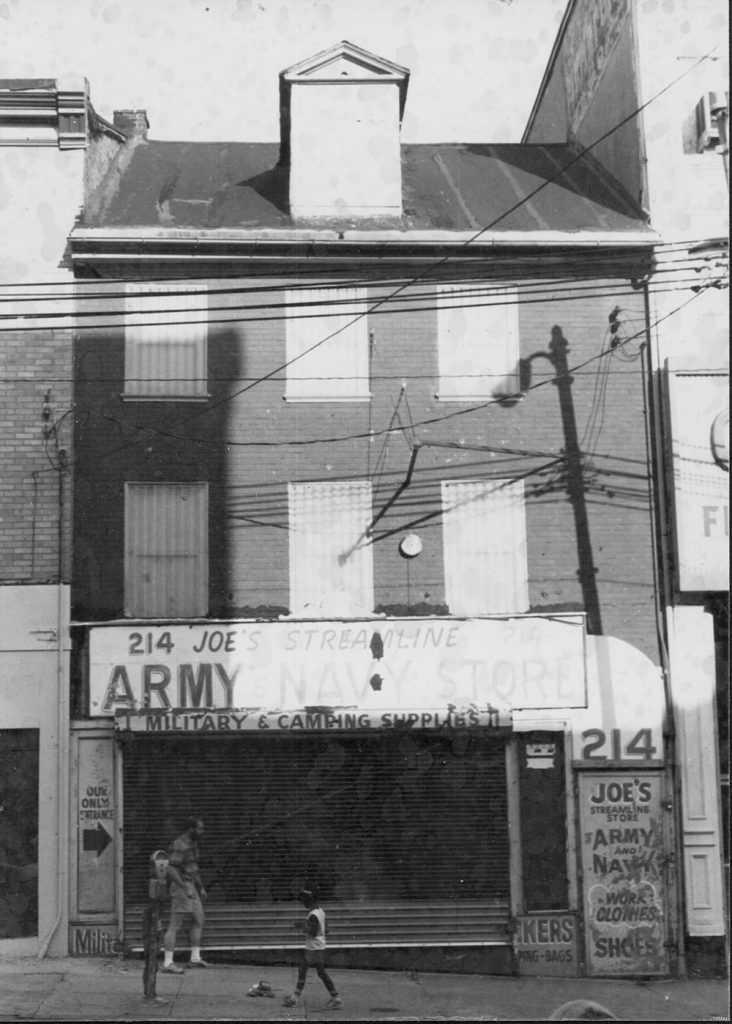
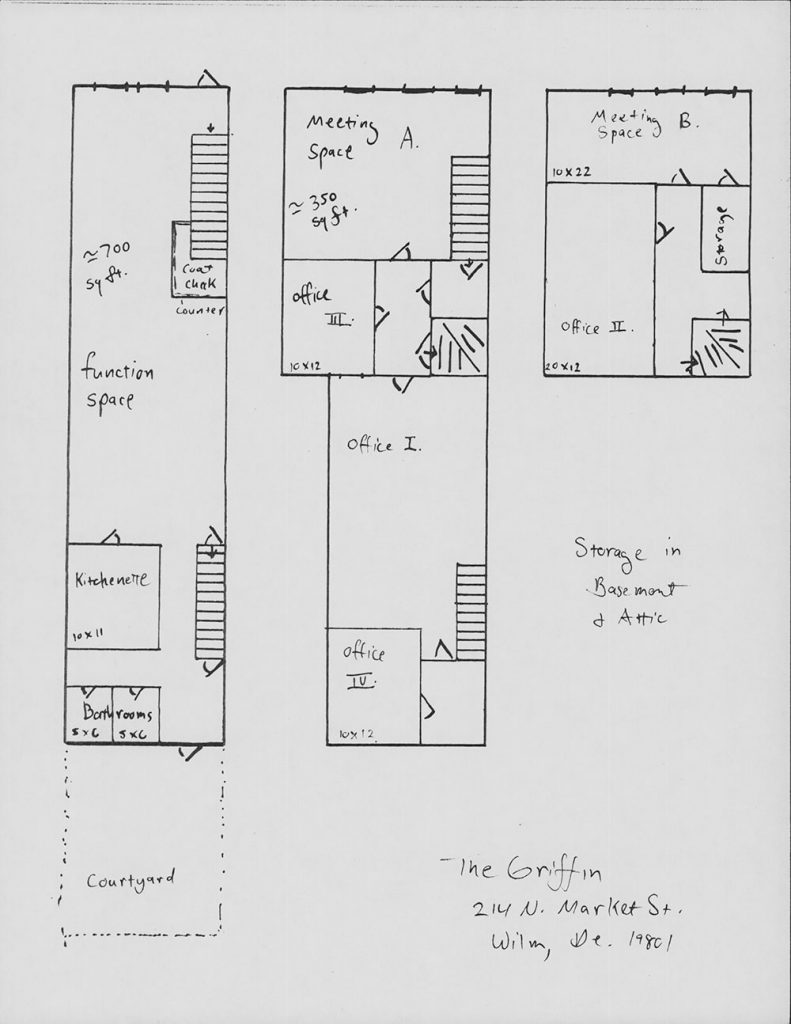
DLGHA sponsored the first HIV/AIDS awareness week and AIDS Walk Fundraiser, “A Walk for Life,” in 1987. During this walk, participants tossed white carnations, symbolizing the lives lost to AIDS, into the Brandywine River. Dominguez recalled it was difficult to get people to attend the first HIV/AIDS walk because of the immense stigma surrounding the disease.
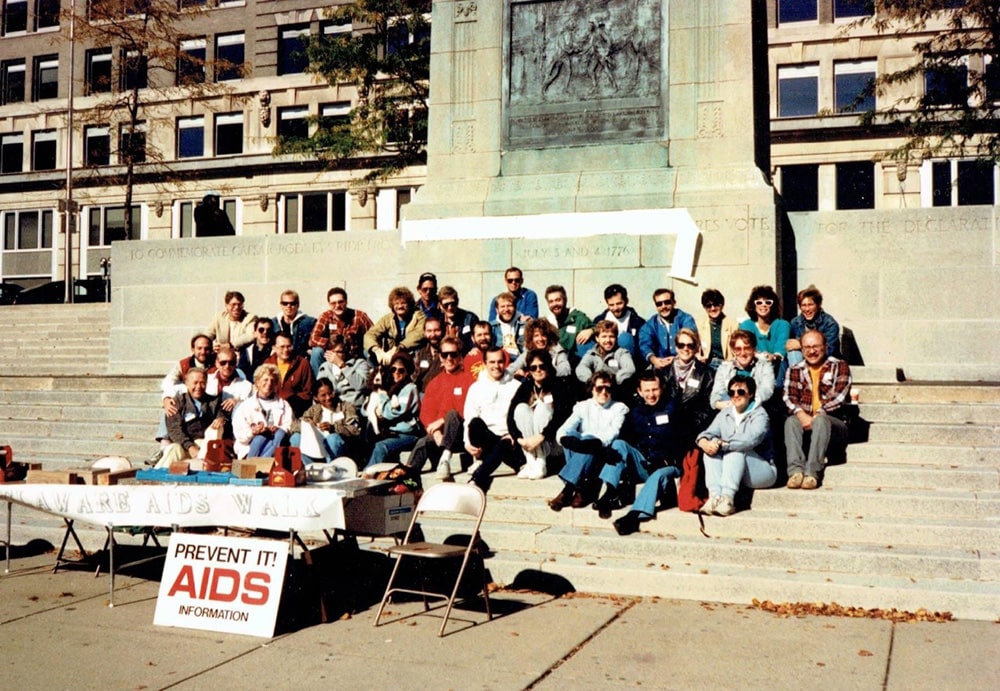
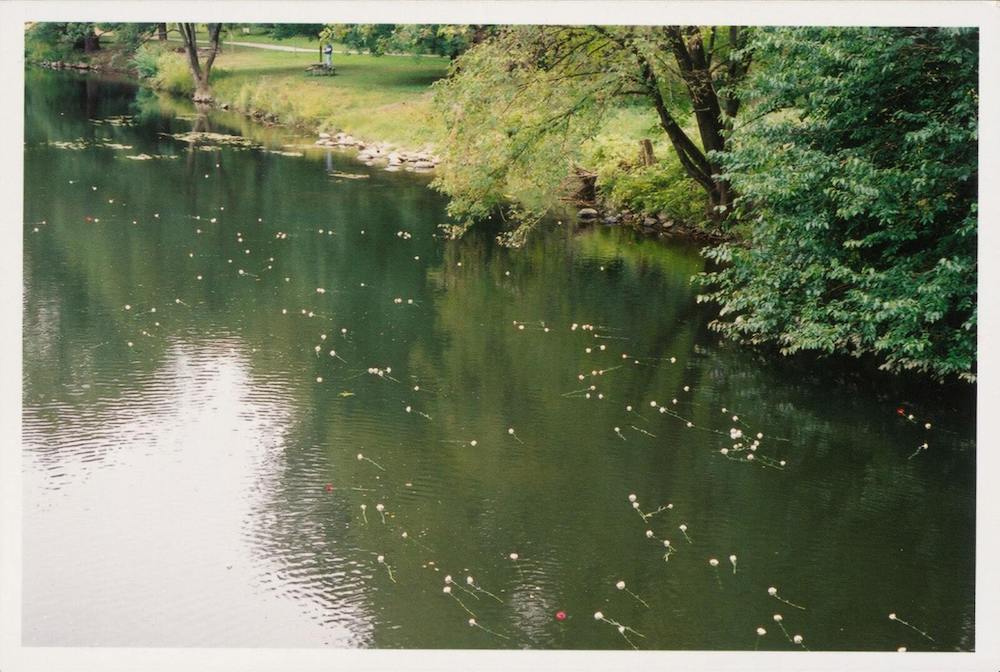
A year later, DLGHA staged a “Die-in protest” at Rodney Square in Wilmington, Delaware’s largest city, to draw attention to the many lives lost and the people still suffering from HIV/AIDS. The Die-in consisted of activists laying on the ground, some with signs that read “Dead from AIDS,” while other activists walked around sharing information about why the protest was happening. The same year, DLGHA helped halt local legislative efforts to re-criminalize sodomy and close queer establishments in Delaware.
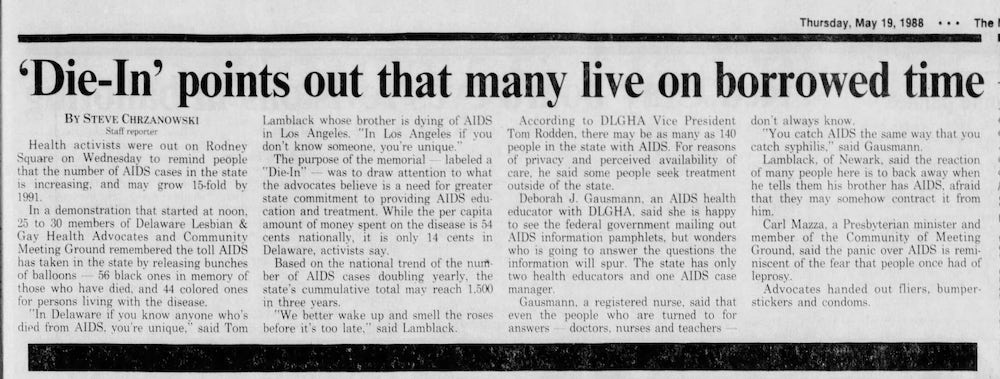
By 1990, Dominguez and Welch were “burned out” from the constant activism, volunteering, and work related to their community center and the HIV/AIDS epidemic. DLGHA was losing volunteers and funds, and by the spring, Dominguez and Welch had to close down the Griffin Community Center. The couple then moved to a rural, forested part of Georgetown in southern Delaware where they built the home they live in today. In the early 1990s, the couple utilized their LGBTQ+ community center experience by assisting the team of volunteers at CAMP Rehoboth in writing the new group’s by-laws.
On a national level, Dominguez also served as a board member of the National Lesbian and Gay Task Force, co-founded by fellow Delawarean Barbara Gittings, in the early 1990s and participated in a Task Force-organized Die-in on the road in front of the White House. He also gave talks about his writing about the Kink community at National Lesbian and Gay Health Task Force conferences, including one in 1993. Meanwhile, Welch was a member of the American Nurses Association Cabinet on human rights and conducted HIV/AIDS work in Ethiopia, Cambodia, and Thailand with the National Alliance of State and Territorial AIDS Directors, of which he once served as president.

Welch and Dominguez have now been together for forty-four years. Welch left the Department of Correction in 2015 after twenty-nine years of state service and now works in national corrections departments as a nurse and volunteers with a LGBTQ+ Returned Peace Corps group on Facebook. Dominguez now focuses his time on writing books on metaphysics and serves as a Wiccan Elder in the Assembly of the Sacred Wheel. He has written over half a dozen metaphysical books and continues to write today. Dominguez dedicated his first book, Beneath the Skins: The New Spirit and Politics of the Kink Community published in 1994, to Welch, writing: “To my beloved, James Conrad Welch, who has been my North star, constant and true since we first loved on a chilly February night in 1979.”
Photo Courtesy: Ivo Dominguez Jr. and University of Delaware Archives and Records Management
Sources:
- Assembly of the Sacred Wheel
- Controverscial.com
- Department of Correction Press Release, “Correctional healthcare chief retires after 29 years of service to Delaware,” May 28, 2015
- Ivo Dominguez Jr. and James Welch oral history interviews with the Delaware Division of Historical and Cultural Affairs, 2023
- Ivo Dominguez Jr. and James Welch oral history interviews with the Delaware Historical Society, 2021
- Lee, Jim. “Fear, Stigma Hampered Early AIDS education,” Delaware Online/The News Journal, September 22, 2016
Explore Other Delawareans
-

Louisa Carpenter
Wilmington and Rehoboth Beach, DE
An equestrian, socialite, and amateur aviatrix who endured a dramatic lesbian love life.
-
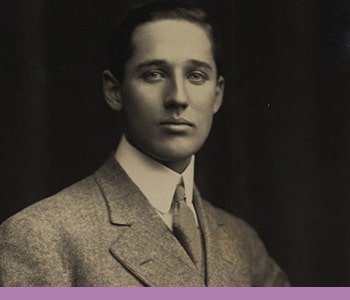
Edward Bringhurst III/V
Wilmington, DE
An amateur photographer, antique collector, and dog breeder who embraced a queer identity behind closed doors.
-
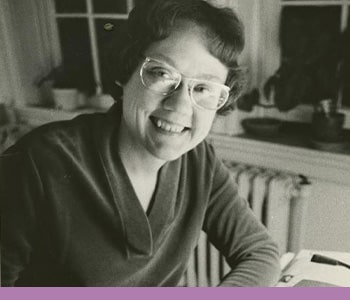
Barbara Gittings
Wilmington, DE
One of America’s most impactful and iconic lesbian activists.
-
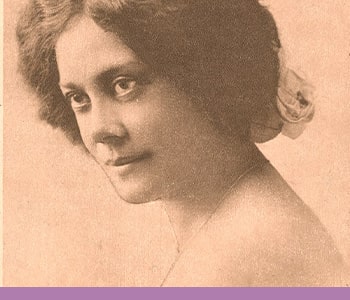
Alice Dunbar-Nelson
Wilmington, DE
A poet, author, activist, educator, and philanthropist who spent her career trying to improve the quality of Black Americans’ lives.


